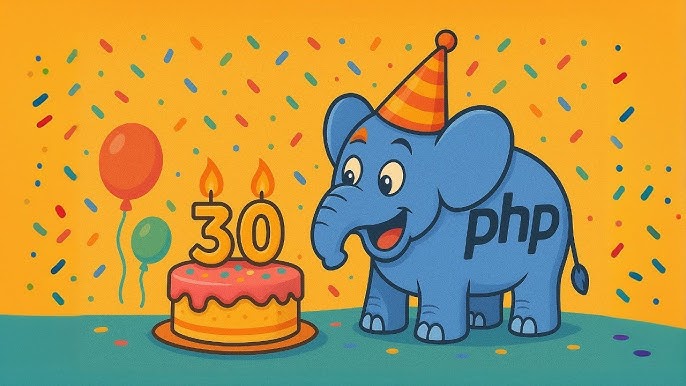Introduction
PHP is a programming language that originated in 1995. Throughout the years, it has evolved into a significant component of the web. For nearly three decades, this open-source language has continuously transformed and enhanced the digital landscape. The PHP community has fostered an environment rich in innovation. This has resulted in the emergence of prominent frameworks such as Laravel and Symfony. This notable anniversary is not solely a reflection of the time that has elapsed. It also serves as an occasion to honor the contributions and efforts of numerous developers and contributors worldwide. As we reflect on PHP’s legacy, it is crucial to recognize the substantial influence it has exerted on web development and beyond.
Reflecting on 30 Years of PHP’s Impact
The impact of PHP over the past thirty years has been significant. This programming language has transformed the way individuals create websites. It enabled the development of sites that offer more than merely displaying basic pages. With PHP’s assistance, platforms such as WordPress and Joomla gained popularity, leading to the expansion of the PHP community.
PHP has consistently been open-source. This principle has united numerous developers and individuals with innovative ideas. They collaborated and enhanced the PHP community further.
There have been pivotal moments for PHP, beginning when it was merely a basic tool. The emergence of new frameworks over time, such as Laravel and Symfony, clearly demonstrates that PHP can adapt to meet user demands. As a result of all these factors, PHP remains a vital component of the web landscape and continues to foster new ideas today.
PHP’s Humble Beginnings in 1995
In 1995, PHP was introduced as a collection of user-friendly tools for web development. Rasmus Lerdorf created PHP to assist in monitoring the visitors to his online résumé. This approach simplified processes and laid the foundation for what has evolved into a robust programming language. From its inception, PHP was accessible to all, enabling collaboration and contributions to enhance its functionality. By encouraging widespread participation, PHP became a vital component of the web. This initiative paved the way for innovative concepts and established a resilient framework that continues to thrive today.
The Open Source Philosophy That Shaped PHP
A significant aspect of PHP’s narrative is its robust support for open source. This concept fosters collaboration among individuals, leading to the generation of innovative ideas within the developer community. As a result, PHP has become user-friendly for a wide audience, allowing programmers globally to contribute to its enhancement. Developers have leveraged this open ethos to create remarkable frameworks such as Laravel and Symfony. Numerous new features in these tools have emerged from close collaboration with PHP’s core as a programming language. The collective efforts of individuals working on PHP enable the language to adapt to emerging technologies, updated algorithms, and the evolving demands of the digital landscape. The open-source model, combined with contributions from many, has enhanced accessibility and ensured the continued growth of PHP, Laravel, and Symfony.
The People Behind PHP’s Success
The evolution of PHP throughout the years can be attributed to a dedicated group of individuals who are passionate about the language. Central to this development is Rasmus Lerdorf, who conceived the initial idea and laid the foundation for what would evolve into a significant programming language. Alongside him, numerous developers and experts in PHP have continuously enhanced the language. They incorporate innovative concepts from programming and machine learning in their efforts. The PHP community remains vibrant and supports all individuals striving to advance it. Collectively, the members of this community ensure that PHP retains its relevance in web development and beyond. Their collaborative efforts guarantee that PHP consistently progresses.
Major Contributors and Core Developers
Numerous developers have played a significant role in the evolution of PHP over the years. Rasmus Lerdorf, the initial contributor, introduced the concept of open collaboration to PHP. The PHP ecosystem has expanded significantly due to influential figures such as Taylor Otwell. Taylor Otwell developed frameworks like Laravel, which enhance the experience for individuals creating websites and applications.
The team responsible for PHP continues to implement modifications and enhancements. They achieve this by collaborating with the PHP community, ensuring that PHP can adapt to emerging trends in the digital landscape. The primary contributors to PHP not only share their code but also actively strengthen the PHP community. This robust PHP community enables PHP to continue evolving and improving for all its users. Today, PHP and its ecosystem are regarded as vibrant and dynamic environments for innovation and mutual support.
How PHP Changed Web Development
The evolution of web development began due to PHP’s versatility. This programming language enabled the creation of dynamic websites that adapt to user interactions. Platforms such as WordPress, Drupal, and Joomla gained popularity, transforming the management of online content. This innovative approach to digital content became evident across the internet. PHP’s application in e-commerce and social networking sites revolutionized online connectivity. This advancement in the PHP ecosystem empowered more individuals to create their own websites. Additionally, it enhanced the overall user experience on the internet. As a result, many users benefited from improved accessibility and enhanced features while navigating the web.
Dynamic Websites Made Possible
PHP simplifies the process of creating websites that adapt and respond to user interactions. This capability has significantly influenced how individuals navigate the internet today. By utilizing machine learning and robust server scripts, PHP can efficiently process data and provide personalized user experiences. This versatility makes PHP applicable in various domains, including e-commerce and social networking.
Frameworks such as Laravel and Symfony play a crucial role in the PHP ecosystem, accelerating the web development process. They enable developers to incorporate new features and enhance site interactivity. As an open-source platform, PHP fosters collaboration and innovation among developers. Consequently, PHP contributes to the advancement of the digital landscape in numerous ways.
PHP’s Role in E-commerce and Social Media Platforms
PHP has become an essential component in the digital landscape. This programming language facilitates the operation of numerous online retail platforms and social media networks. Many users prefer PHP due to its efficiency in managing dynamic content that requires user authentication or participation. It is capable of executing complex algorithms to tailor experiences for individual users based on their preferences. Major e-commerce websites utilize PHP to oversee their inventory and ensure a seamless purchasing experience for customers.
Social media platforms also rely on PHP for its ability to manage the influx of millions of users logging in and sharing content daily. As an open-source language, PHP is continuously being improved by developers who contribute to its evolution. Each year, PHP enables the creation of innovative solutions within these online domains.
The Vibrant World of PHP Frameworks
Numerous frameworks have emerged from the PHP ecosystem. Each framework is designed to cater to various developer requirements and preferences. Laravel stands out as a prominent name due to its straightforward approach to coding. It has transformed the way individuals engage with the PHP ecosystem, primarily enhancing accessibility and productivity. Symphony is another notable framework, recognized for its robustness and versatility. This versatility makes Symphony an excellent choice for large enterprises and their applications.
Other commendable frameworks include Zend, CodeIgniter, and CakePHP. These frameworks also contribute significantly to the PHP ecosystem, enabling developers to utilize powerful algorithms and simplified methods for project deployment. The continuous improvement of these frameworks demonstrates PHP’s adaptability to evolving trends. It effectively addresses emerging challenges in programming as they arise.
The Future of PHP: What’s Next?
As PHP continues to evolve, the emphasis will be on enhancing its speed and security. Additionally, there will be a greater commitment to adhering to current coding standards. The PHP Foundation aims to secure funding to support these initiatives aimed at improvement. This approach will enable them to maintain a robust strategy for the future. New tools and features will be introduced to meet the diverse needs of developers worldwide.
PHP Foundation and Funding Initiatives
Institutional support is crucial for the longevity of any programming language. The PHP Foundation provides the necessary funding to continue development on PHP. This financial support aids in resolving issues, implementing updates, and assisting the PHP community. The foundation collaborates with companies such as JetBrains and Red Hat. Such partnerships enhance awareness of PHP and attract additional resources for new initiatives. These funding endeavors are significant. They contribute to improving accessibility and introducing new tools. Consequently, this facilitates PHP’s adaptation to contemporary trends, including AI and machine learning, globally.
Upcoming Features and Roadmap
Exciting developments are on the horizon for PHP as the language evolves to meet contemporary demands. New features are set to enhance PHP’s performance and address the requirements of the PHP community. There is a particular emphasis on interoperability with other tools and simplifying PHP for all users. The PHP Foundation is allocating funds to initiatives that will introduce innovative algorithms and streamline deployment processes for everyone. Prominent companies such as Red Hat and JetBrains are also participating, contributing to improvements in PHP’s compatibility with machine learning and introducing advancements to well-known frameworks like Laravel and Symfony. As a result of these efforts, the outlook for PHP over the next five years appears very promising.



